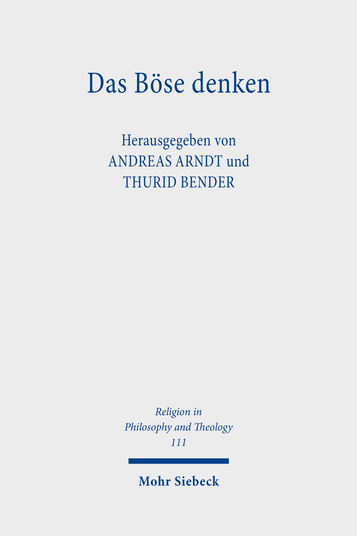Theology
Das Böse denken
Zum Problem des Bösen in der Klassischen Deutschen Philosophie
Herausgegeben von Andreas Arndt und Thurid Bender
[Thinking Evil. The Problem of Evil in Classical German Philosophy.]
89,00 €
including VAT
including VAT
sewn paper
ISBN 978-3-16-160064-7
available
Also Available As:
Published in German.
By believing in the power of reason and the scientific and cultural, but also the moral progress of humankind, the Enlightenment largely marginalised the problem of evil. That this one-sided insistence on reason can itself turn into evil was painfully illustrated by the reign of terror during the French Revolution. Superseding the Enlightenment, classical German philosophy understands that reason can only develop its true power and goodness by confronting evil. Thus comes the new, bold demand: to think and understand evil in all its depths.Survey of contents
Thurid Bender: Zur Einführung: Das Böse denken – Joachim Ringleben: Das anstößige Thema Sünde – oder wie die Aufklärung zur Vernunft kommt – Burkhard Nonnenmacher: Kants Begriff des Bösen und Hamartiologie – Sebastian Böhm: Die paradoxe Aneignung der Autonomie – Alexandre Lissner: Kant und der Skandal des Idealismus – Thurid Bender: Terror und Erlösung. Erscheinungsformen des Bösen bei G.W.F. Hegel – Anne Becker: Die logische Erfassung des Bösen – Gilles Marmasse: Hegel und das Übel in der Geschichte – Christian Danz: Der »umgekehrte Gott«. Schellings identitätsphilosophisches Verständnis des Bösen in der Freiheitsabhandlung von 1809 – Christoph Binkelmann: Das Böse ist Ansichtssache – aber auch Realität. Über einen vernachlässigten Aspekt in Schellings Freiheitsschrift – Vincent Giraud: Das Böse als Nichts: Schelling und Augustinus – Christoph Asmuth: »Es ist eine abgeschmakte Verläumdung der menschlichen Natur, daß der Mensch als Sünder gebohren werde« – Fichte über das Böse – Andreas Arndt: »... das Böse ist nur außer dem Werden des höchsten Gutes«. Die Relativität des Bösen bei Schleiermacher
